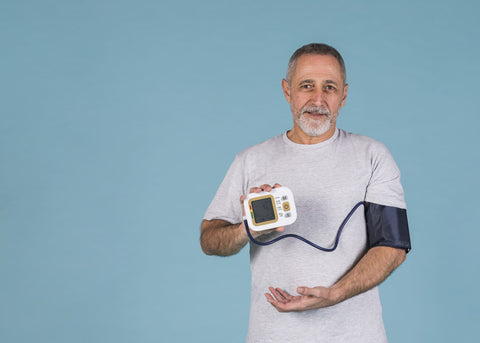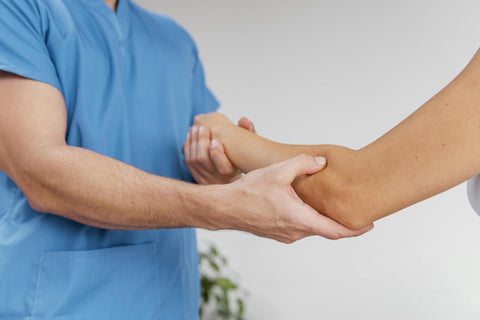Most people in developed and developing countries have blood pressure numbers that are higher than they should be.
Hypertension is a very serious health concern as it damages blood vessels and increases the risk of heart failure, stroke, and other health problems.
It is a leading cause of stroke, killing 40,000 Britons every year. Most people with this condition have no symptoms, even when their blood pressure readings reach dangerously high levels.

Normal and Abnormal Blood Pressure Ranges
Ideal blood pressure of a healthy person should be between 100/60 and 110/70 mm Hg. A pressure that is still regarded as normal should not exceed 120/80.
First number indicates systolic blood pressure which measures the pressure during heart contraction. The second number indicates diastolic blood pressure which measures the pressure during heart relaxation.
Both the systolic and the diastolic blood pressure numbers are equally important. Elevated systolic pressure has a greater effect on the heart. On the other hand, the elevated diastolic readings can independently affect a person's risk, even if the systolic pressure is normal.
- Low blood pressure (hypotension): Lower than 90/60
- Ideal blood pressure: 100/60 – 110/70
- Normal blood pressure: Lower than 120/80
- Prehypertension: 120–130/not more than 80
- Stage 1 high blood pressure: 130–140/80–90
- Stage 2 high blood pressure: Over 140/over 90
Proper Blood Pressure Checking
While checking blood pressure the following factors may affect the validity of blood pressure reading:
- Inappropriate size of blood pressure cuffs
- Incorrect position of the arm
- Emotional stress
- Fear associated with being examined by medical personnel
To make sure the reading is correct avoid exercising, eating, drinking caffeinated beverages, or smoking within 30 minutes of measuring your blood pressure.
Lifestyle and Nutritional Tips
– Use sea salt, Celtic salt, or Himalayan salt instead of refined one.
– Dietary potassium deficiency increases blood pressure by stimulating sodium reabsorption. If you don’t like foods rich in potassium (raw veggies, bananas, potatoes with skin, etc.) you must take it in a supplemental form.
– Avoid (or significantly reduce) consumption of sugar, fructose, glucose, white flour products, refined grains, fruit juices. Refined sugar and fructose (from high fructose syrup and fruit juices) can cause your blood pressure to skyrocket. You can use whole fresh and dried fruits, raw organic honey, erythritol, stevia, or xylitol instead of sugar.
– Lower bad cholesterol levels by going on a healthy unrefined plant-based diet. Frequently consume the following foods: Whole oats and oat bran, barley, artichoke, pulses, psyllium husk, ground flaxseed, chia seeds, garlic, cabbage family, all veggies, seeds and nuts.
– Go for a fast walk and exercise every day, gradually increasing pace and duration. It will make your heart stronger enabling it to pump more blood with less effort. As a result, the blood impact on the arteries decreases helping to lower high blood pressure.
– Regular energetic exercise, magnesium, 5-HTP (tryptophan), and Ashwagandha will help you to control stress and relax your blood vessels. Emotional stress elevates the levels of adrenalin and stimulates adrenal glands to produce more aldosterone which raises blood pressure.
– Drink more clean water between meals and use natural supplements such as Aquaflow (HealthAid) to help your kidneys.
– Take Ashwagandha supplements for your adrenal glands as they play important role in regulating blood pressure.
– Make sure you take care of your thyroid taking Kelp tablets (HealthAid) – the best natural source of iodine. When the thyroid gland doesn’t produce enough thyroid hormone or produces too much of it, high blood pressure can result.
– Lose weight if you are overweight. When you gain weight, the amount of blood circulating through your body increases imposing pressure on arterial walls. In addition, fat deposits can release chemicals that raise blood pressure.
– High blood glucose and insulin resistance contribute to hypertension by causing magnesium deficiency and sodium retention.
Check your blood glucose from time to time. If it is not normal, improve your diet and take Glucobate (HealthAid). It contains key vitamins, minerals, antioxidants, and natural plant extracts to help maintain normal blood sugar levels.
– About 15 percent of high blood pressure cases could be caused by Conn’s syndrome. In this condition small non-cancerous growths on adrenal glands stimulate aldosterone which elevates sodium in the blood. It reduces urine output and increases the circulating blood volume elevating blood pressure.
Unfortunately, this condition is difficult to diagnose as the growths on adrenal glands are often too small to detect.

Nutritional Supplements
– After reviewing 12 clinical studies, scientists concluded that regular intake of Coenzyme Q10 helps to lower blood pressure. We gradually lose this very important antioxidant with age and most of us do not get enough of it from food. For this reason, experts recommend supplementing it. Those who are over 60 and individuals who are on statins should take 100 – 200 mg of CoQ10 every day.
– Due to the sever soil degradation, unhealthy diet, use of stimulants, emotional stress, and other factors almost all people today are deficient in Magnesium. Taking 300mg of elemental Magnesium every day significantly lowered high blood pressure and improved blood flow. People who have hypertension have low levels of magnesium.
Magnesium helps relax muscles (including heart and muscles surrounding arteries) thus lowering high blood pressure. If you are deficient in magnesium your blood vessels will tend to constrict raising blood pressure. In addition, magnesium also helps relax our nervous system and improve our ability to control stress.
– Take 5,000 IU of Vitamin D3 every day with first meal. In human body vitamin D deficiency activates certain mechanisms that negatively affect the cardiovascular system and blood pressure.
- Take 100-500mcg of Vitamin K2 (MK-7) every day to prevent calcification (hardening) of your arteries. Vitamin K2 deficiency increases the risk of hypertension as this vitamin is one of the most important factors to prevent calcification (hardening) of arteries.
– In our body, amino acid L-arginine is converted to nitric oxide, a special natural gas found in arteries which helps relax blood vessels lowering blood pressure.
– According to a 2020 study, “Garlic lowers blood pressure in hypertensive subjects, improves arterial stiffness and gut microbiota.”
Garlic as a food and garlic supplements can help relax smooth muscles and lower blood pressure when it is too high. Garlic also supports normal blood pressure because it is known to reduce bad cholesterol, helps thin the blood, and helps prevent the blockage in blood vessels.
Sources
- Dr Michael Greger, How Not to Die from High Blood Pressure: https://nutritionfacts.org/video/how-not-to-die-from-high-blood-pressure/
- Does Vitamin D Deficiency Lead to Hypertension: https://www.ncbi.nlm.nih.gov/pmc/articles/PMC5356990/
- Vitamin D Deficiency and Essential Hypertension: (PDF) Vitamin D Deficiency and Essential Hypertension (researchgate.net)
- Filippini, T., Violi, F., D’Amico, R., & Vinceti, M. (2017). The effect of potassium supplementation on blood pressure in hypertensive subjects: A systematic review and meta-analysis. International journal of cardiology, 230, 127–135.
- Albert, D. G., Morita, Y., & Iseri, L. T. (1958). Serum magnesium and plasma sodium levels in essential vascular hypertension. Circulation, 17(4, Part 2), 761–764.
- Resnick, L. M., Gupta, R. K., & Laragh, J. H. (1984). Intracellular free magnesium in erythrocytes of essential hypertension: relation to blood pressure and serum divalent cations. Proceedings of the National Academy of Sciences of the United States of America, 81(20), 6511–6515.
- Vitamin K2 deficiency: Low levels increase risk of hypertension: https://www.express.co.uk/life-style/health/1384698/vitamin-k2-deficiency-signs-hypertension-diabetes-osteoporosis
- Thyroid problems and high blood pressure: Secondary hypertension - Symptoms and causes - Mayo Clinic
- Garlic lowers blood pressure in hypertensive subjects, improves arterial stiffness and gut microbiota: Garlic lowers blood pressure in hypertensive subjects, improves arterial stiffness and gut microbiota: A review and meta-analysis - PubMed (nih.gov)
- He, J., & Whelton, P. K. (1999). Effect of dietary fiber and protein intake on blood pressure: a review of epidemiologic evidence. Clinical and experimental hypertension (New York, N.Y. : 1993), 21(5-6), 785–796.
- Coenzyme Q10 in the treatment of hypertension: a meta-analysis of the clinical trials: https://pubmed.ncbi.nlm.nih.gov/17287847/
- The Effects of L-Arginine in Hypertensive Patients: A Literature Review: The Effects of L-Arginine in Hypertensive Patients: A Literature Review - PMC (nih.gov)
- Dr Josh Axe, High Blood Pressure Symptoms You Can Reverse Naturally: https://draxe.com/health/high-blood-pressure-symptoms/
Image by Freepik Image by pch.vector on Freepik Image by Freepik
Image by Freepik Image by Freepik
Any information or product suggested on this website is not intended to diagnose, treat, cure or prevent any medical condition. Never disregard medical advice or delay in seeking it because of something you have read on this website. Consult your primary healthcare physician before using any supplements or making any changes to your regime.




